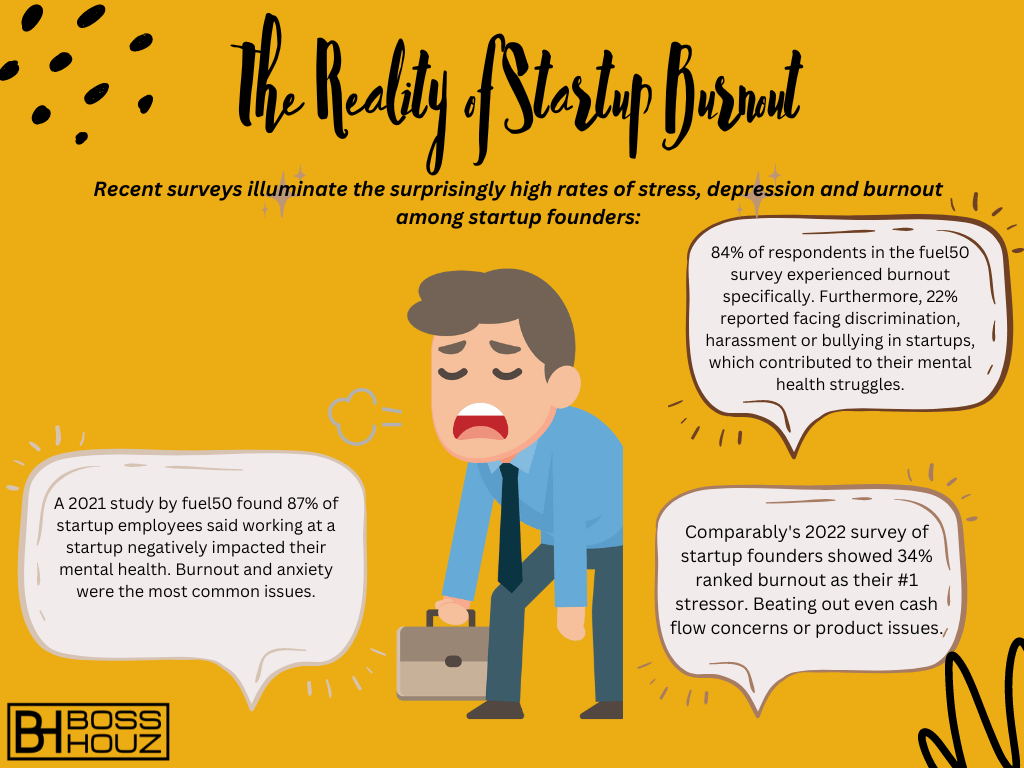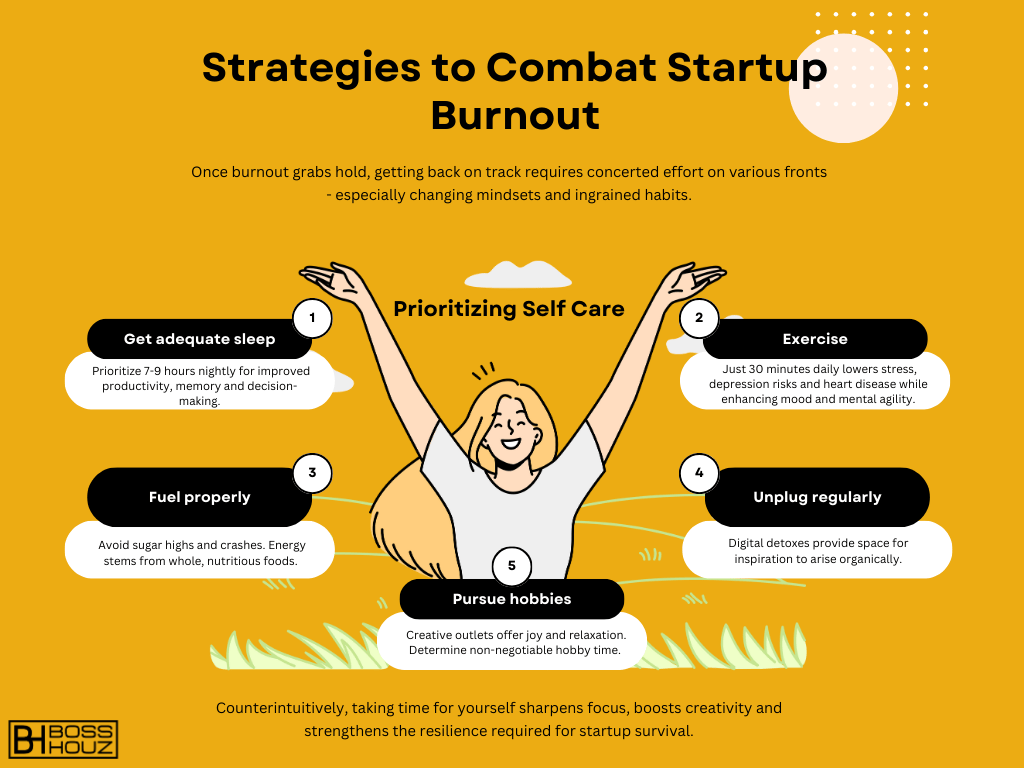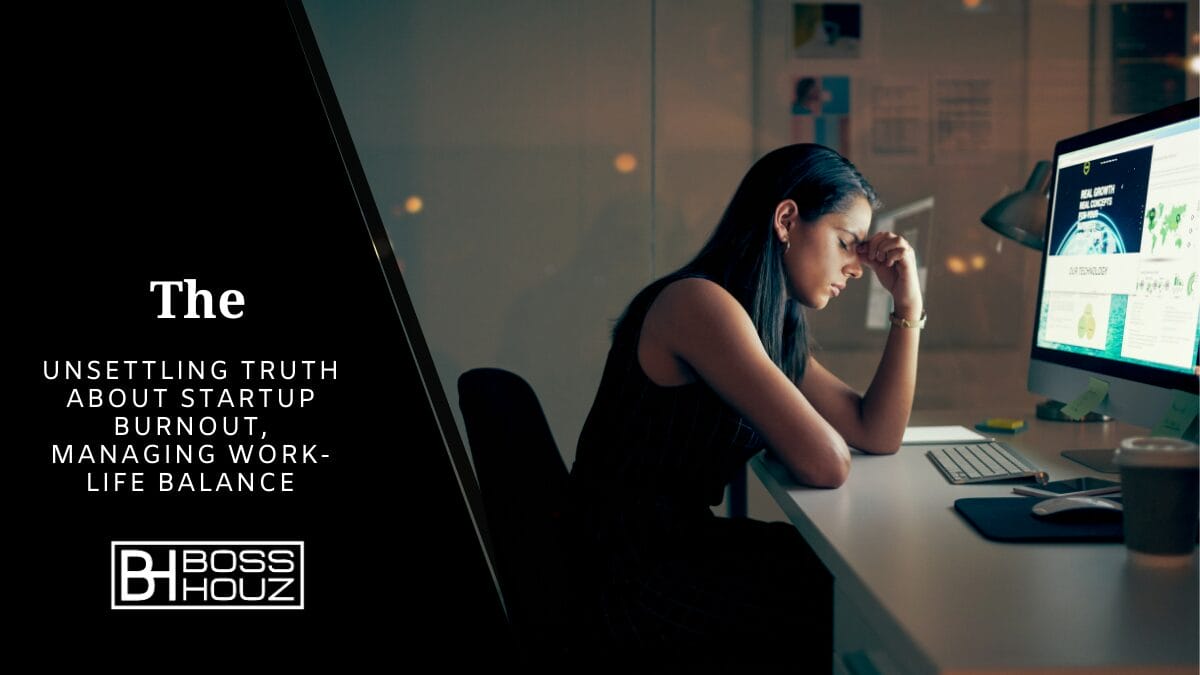The allure of startup culture pulls people in with promises of fast-paced innovation, autonomy over one’s schedule, and the chance to disrupt entire industries. However, behind the glamor lies an unsettling truth about the mental health ramifications that manifest in the form of startup stress, founder fatigue, entrepreneurial burnout and the hustle culture hangover.
This article unveils the shocking statistics around entrepreneur burnout and mental health challenges in the startup world. We analyze the factors that contribute to the prevalence of burnout, including the very structure of startup environments. Further, we provide research-backed insights into managing work-life balance in startups along with actionable strategies to mitigate burnout risks.
Table of Contents
The Reality of Startup Burnout


Recent surveys illuminate the surprisingly high rates of stress, depression and burnout among startup founders:
- A 2021 study by fuel50 found 87% of startup employees said working at a startup negatively impacted their mental health. Burnout and anxiety were the most common issues.
- 84% of respondents in the fuel50 survey experienced burnout specifically. Furthermore, 22% reported facing discrimination, harassment or bullying in startups, which contributed to their mental health struggles.
- Comparably’s 2022 survey of startup founders showed 34% ranked burnout as their #1 stressor. Beating out even cash flow concerns or product issues.
These statistics reveal the scope of the problem across European and US startups. Burnout in startups is clearly an unbiased epidemic affecting founders regardless of background, skill sets or success metrics.
Contributing Factors to Burnout
The embedded hustle culture amongst high-profile startup founders distorts reality. Propagating the harmful myth that putting in 100+ hour work weeks and never taking a day off equals productivity and necessary sacrifice.
However, scientific consensus proves the opposite is true:
- Working over 55 hours per week increases the risk of impaired sleep, depression, alcohol abuse and even stroke3.
- Cognitive output and creativity plateau after 50 hours per week, then sharply decline past 70 hours 3.
- Workers who take regular vacations experience higher job performance and less risk of heart disease4.
Clearly, the notion that more hours equals more productivity is not grounded in science or factual evidence. This falsehood pervades startup culture, exacting real damage to founder wellbeing and output.
Recognizing Burnout Signs
Burnout manifests in various physical, emotional and behavioral ways:
- Chronic exhaustion
- Cynicism, irritability and negativity
- Reduced performance and productivity
- Frequent headaches or gastrointestinal issues
- Increased sickness and weakened immune system
- Difficulty concentrating, impaired memory and brain fog
- Changes in appetite or sleep patterns
- Feeling helpless, defeated and resentful
- Loss of motivation, detachment from responsibilities
Caught in the grip of burnout, creative vision suffers along with innovation capacities. Once vibrant entrepreneurs descend into detached zombies mechanically going through the motions.
This impacts the very engine driving startups – the creative ideas stemming from engaged, energetic founders and employees.
Managing Work-Life Balance in Startups
Amidst the excitement of new ventures, founders easily neglect setting boundaries. Days bleed into nights as work engulfs personal lives.
To combat impending burnout, consciously building boundaries protects your most valuable asset – your mental and physical health.
Setting Boundaries
Practical ways to delineate work-personal life include:
- Establish work hours and stick to them. Avoid 24/7 “always on” expectations.
- Don’t check emails outside designated work times.
- Set OOO email notifications for time off.
- Block off calendar appointments for exercise, family activities, hobbies – treat them as seriously as you would client meetings.
Separating work from personal life also means distinguishing your self-worth from your output. Learn to detach yourself from the rollercoaster ride of startup stresses. Easier said than done, but meditative and mindfulness practices help gain perspective.
Time Management Techniques
Unpredictable emergencies and shifting priorities make time management uniquely challenging in startups. Nevertheless, certain techniques provide structure amidst the chaos:
- The Ivy Lee Method – At the end of each work day, write down six priority tasks for the next day. The following day, focus solely on those six tasks before moving to anything else. This stops nonessential tasks from invading your schedule.
- Time Blocking – Assign set blocks for specific activities like meetings, strategic thinking, admin work and email. Time boxing provides organization and ensures key responsibilities don’t slip through the cracks.
- The Pomodoro Technique – Alternate 25 minute periods of focused work with 5 minute breaks. This rhythm enhances concentration while preventing burnout.
- Batching Similar Tasks – Group related tasks like replying to emails, phone calls or meetings together. It allows you to focus on one type of responsibility at a time versus constant task switching.
Strategies to Combat Startup Burnout


Once burnout grabs hold, getting back on track requires concerted effort on various fronts – especially changing mindsets and ingrained habits.
Prioritizing Self Care
Counterintuitively, taking time for yourself sharpens focus, boosts creativity and strengthens the resilience required for startup survival.
- Get adequate sleep – Prioritize 7-9 hours nightly for improved productivity, memory and decision-making.
- Exercise – Just 30 minutes daily lowers stress, depression risks and heart disease while enhancing mood and mental agility.
- Fuel properly – Avoid sugar highs and crashes. Energy stems from whole, nutritious foods.
- Unplug regularly – Digital detoxes provide space for inspiration to arise organically.
- Pursue hobbies – Creative outlets offer joy and relaxation. Determine non-negotiable hobby time.
Often the first activity cut when things get busy, self-care is actually the most valuable time investment.
Building Support Systems
The weight of startup survival often falls heavily on founders’ shoulders. However, no successful startup is built single-handedly. Mentorship, networking and community connections provide critical guidance and support.
Seeking wise counsel from experienced founders helps navigate unfamiliar territory. Peer groups open opportunities to vent frustrations and trade war stories. While startup communities create a broader web of potential partners, beta testers and helpers along the journey.
Flexible Work Options
Telecommuting and flexible schedules alleviate burnout risks through better work-life harmony.
- Working from home cuts commute times and lowers work-related stress. Employees gain back on average over 30 minutes daily.
- Flexibility over start and end times leads to better sleep and greater job satisfaction.
Offering options like remote work and flexible scheduling demonstrates that management acknowledges sustainability challenges in startup environments.
Leveraging Technology for Balance
Specialized tools enhance founders’ capacities to organize, manage stress and bolster productivity – all helpful supports given chaotic startup demands.
Recommended apps include:
- Todoist, Asana, Trello, Monday – task and project management
- Slack, Zoom, Google Suite – streamlined team communication
- Headspace, Calm, Simple Habit – meditation & mindfulness
- Insight Timer, Aura, Sleep Cycle – sleep support
- Daylio, MindDoc, Youper – mood tracking and mental health
While no app solves burnout on its own, tailored solutions help lighten overwhelming workloads.
Real Life Startup Burnout Stories
Hearteningly, some entrepreneurs maintain healthy boundaries despite extreme pressures. Taking time for self-care while building companies now worth billions.
Stripe founders John and Patrick Collision created workspace flexibility from day one.* Setting the tone for employees to prioritize mental health without repercussions. Now with over 40 million users globally, the $95 billion fintech startup boasts impressive talent retention stats including a 92% employee satisfaction rate.
Other startup success stories end less ideally. These hard-learned lessons demonstrate the costs of unchecked burnout:
- Former Moz CEO Sarah Bird battled depression and alcohol abuse trying to save the company post-2008 financial crisis. She was constantly on the verge of burnout which affected her leadership. After an employee revolt, layoffs and revenue nosediving 95%, Bird resigned.
- Customer service software startup Klipfolio grew quickly to over 200 employees. But the founders struggled to keep up with operational scale. After equity was sold to fuel more rapid expansion, co-founder Allan Wille realized no more band-aid solutions remained. At this breaking point, he walked away from the startup he built over 17 years.
In both cases, Burnout Warns of Unsustainable Startup Culturesfounder well-being served as the canary in the coal mine. Undue stress compounded until both the leaders and companies arrived at painful inflection points.


Creating a Sustainable Startup Culture
Instead of limping from crisis to crisis, proactive startups embed wellness into company culture from day one.
Promoting Mental Health Awareness
Destigmatizing conversations about burnout, anxiety and depression allow more employees to speak up before hitting rock bottom. Training managers to recognize warning signs identifies emerging issues early on.
Dedicated mental health days provide opportunities to recharge without guilt. Some startups even offer counseling benefits or apps providing access to licensed therapists.
Implementing Organization Changes
Preventative measures like the following reinforce work-life balance:
- Mandatory minimum vacation days, sick days and parental leave
- Limited after hours/weekend work expectations
- Focus on deliverables rather than facetime
- Anonymous surveys to gauge employee satisfaction and areas for improvement
Structural changes relieve individuals from having to set overly rigid personal boundaries that may hamper their workplace social connections or advancement perceptions.
Wrapping up The Unsettling Truth About Startup Burnout
Behind the innovative exuberance of startups lurks a darker reality of entrepreneurial pressure causing burnout, anxiety and depression for many founders.
The mythic figures upheld as startup icons often gloss over their mental health sacrifices. But grinding yourself to the bone rarely converts to sustainable business success. Savvy founders and investors actually consider founder health as a top predictor of startup prosperity.
Therefore, actively safeguarding mental wellness allows entrepreneurs and their companies to not just survive but thrive. Mindfulness, supportive communities, smart goal setting and values-aligned operations constitute the competitive edge for the next generation of startups.
Recommended Resources
To learn more about managing startup burnout and strategically balancing business-building with personal sustainability check out:
Books
- Essentialism: The Disciplined Pursuit of Less by Greg McKeown
- Deep Work: Rules for Focused Success in a Distracted World by Cal Newport
- Rest: Why You Get More Done When You Work Less by Alex Soojung-Kim Pang
Podcasts
- By Founders For Founders
- Venture Stories
- The Startup Chat
Courses
- Building a Life by Amy Nguyen Chambers
- Founder Fuel Monthly Membership
- How to Avoid Burnout from SavvyCal
Ready to dig deeper into founder psychology, mindset shifts and scaling sustainably? Download the Boss Houz free ebook on avoiding startup burnout. Arm yourself with research-backed insights before the pressures of entrepreneurship lead to fatigue.








